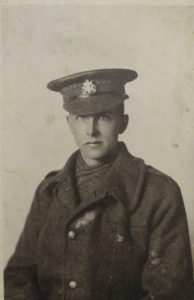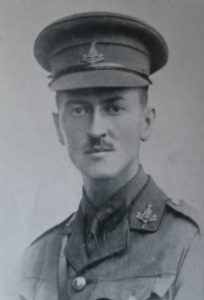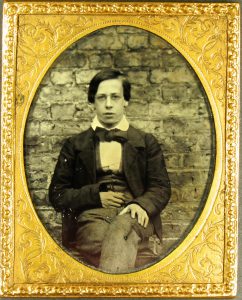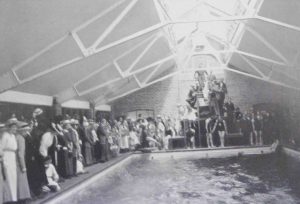
Hans Frederick Hundt was killed in action, May 25th 1915. He served in the 1/23rd London Regiment. He was born in London in 1894 and attended Bootham between 1908 and 1910.
Mrs. Hundt sent some extracts from her son’s letters to ‘Bootham’ magazine:—
Somewhere in France, March 22nd.
We have moved twice since I last wrote. We had to march about 15 miles over dreadful roads, uneven cobbles, to a small village about 12 miles behind the firing line. We were billeted in a large farm, 38 of us, and had some excitement with the rats.
France, April 2nd.
Have done very well on this most unique birthday (21st). It is one I am not likely to forget in a hurry. Had heaps of parcels and good things. Yesterday we were medically examined after having a glorious shower bath. I passed through all right. We marched four miles, and used the baths for the miners.
France, April 8th, 1915.
We moved again yesterday about 4 miles nearer the firing line, and expect to be in the reserve trenches next week. I am in a large loft over a cowshed, have plenty of straw, and am quite comfortable. Can get plenty of eggs (cooked) at the Farm House, coffee, bread and butter, so am living like a lord.
April 12th.
It is very quiet here, and if it were not for the sound of the firing one would not realise that anything was on. Last night mounted sentry with one of the Regulars, did three spells; it was rather an experience. The German trenches are some 300 yards away, and the whole space between, is a mass of barbed wire entanglements. The fellows we are with are a very decent lot.
France, May 12th. (Last letter received.)
The next night we were relieved and marched back about 5 miles to a very pretty little place where we were billeted in a large hall place. There was a canal running through, so we managed to get a bathe. It was a treat, and we made the most of it. We marched some 6 miles further back yesterday to the same piece we were last before leaving for the trenches. I am in the same billet, and quite comfortable, have plenty of clean straw. Isn’t it dreadful about the Lusitania? They are simply barbarians! We had some of those pipes, through which they pump their poisonous gas, opposite our trenches last time, but am thankful to say they did not use it. We each had a piece of gauze and some bicarbonate of soda handy to dip it into should they have used it. I believe we are going to have twelve days’ rest; I hope so, for we can do with it. Terrific bombardments are going on, and there is no doubt big moves are being made.



